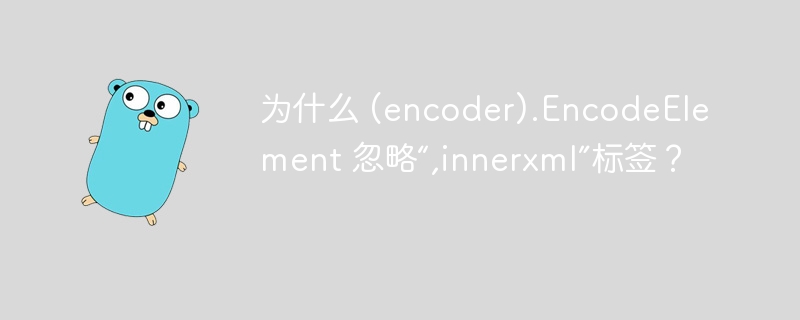

php小编小新在这里为大家解答一个常见问题:“为什么 (encoder).EncodeElement 忽略“,innerxml”标签?”。这个问题涉及到在使用 (encoder).EncodeElement 方法时,为什么会出现无法编码 innerxml 标签的情况。下面我们将详细回答这个问题,帮助读者更好地理解和解决相关问题。
用途:我有一个 xml 文档,其中包含许多混合内容 cdata 元素,我需要以编程方式编辑这些元素。令人烦恼的是,由于 cdata 元素具有其他/混合内容,默认的“,cdata”标记无法正常工作(根据 xml 规范)。如果您对此具体细节有疑问,请告诉我。
问题:在下面的简化示例中,我将其中包含 cdata 的元素标记为“,innerxml”,以便自己处理前缀/后缀。通过解组,一切都按预期工作,但是通过编组(编码),特殊字符被转义。当标签明确表示不转义时(通过“,innerxml”标签),为什么 EncodeElement 方法会转义特殊字符?当我在文档中读到此方法时,它让我参考 xml.Marshal 方法,其中包含以下内容:
<code> a field with tag ",innerxml" is written verbatim, not subject to the usual marshaling procedure. </code>
示例:
以下是代码(也可在 https://go.dev/play/p/MH_ONAVaG_1 获取):
package main
import (
"encoding/xml"
"fmt"
"strings"
)
var xmlFile string = `<?xml version="1.0" encoding="UTF-8"?>
<statusdb>
<status date="today">
<![CDATA[today is < yesterday]]>
</status>
<status date="yesterday">
<![CDATA[PM,
1. there are issues with the marshaller
2. i don't know how to solve them]]>
</status>
</statusdb>`
type statusDB struct {
Status []*status `xml:"status"`
}
type status struct {
Text string `xml:",innerxml"`
Date string `xml:"date,attr"`
}
type statusMarshaller status
func main() {
var projectStatus statusDB
err := xml.Unmarshal([]byte(xmlFile), &projectStatus)
if err != nil {
fmt.Println(err)
return
}
fmt.Println("In Go: \"" + projectStatus.Status[0].Text + "\"")
fmt.Println("In Go: \"" + projectStatus.Status[1].Text + "\"")
x, err := xml.MarshalIndent(projectStatus, "", " ")
if err != nil {
fmt.Println(err)
return
}
//why this is not printing properly
fmt.Printf("%s\n", x)
}
func (tagElement *status) UnmarshalXML(d *xml.Decoder, se xml.StartElement) error {
temp := statusMarshaller{}
d.DecodeElement(&temp, &se)
temp.Text = strings.TrimSpace(temp.Text)
temp.Text = strings.TrimPrefix(temp.Text, "<![CDATA[")
temp.Text = strings.TrimSuffix(temp.Text, "]]>")
*tagElement = status(temp)
return nil
}
func (tagElement status) MarshalXML(d *xml.Encoder, se xml.StartElement) error {
tagElement.Text = "<![CDATA[" + tagElement.Text + "]]>"
temp, _ := xml.Marshal(statusMarshaller(tagElement))
return d.EncodeElement(temp, se)
}此代码返回以下内容:
In Go: "today is < yesterday"
In Go: "PM,
1. there are issues with the marshaller
2. i don't know how to solve them"
<statusDB>
<status><statusMarshaller date="today"><![CDATA[today is < yesterday]]></statusMarshaller></status>
<status><statusMarshaller date="yesterday"><![CDATA[PM,
 1. there are issues with the marshaller
 2. i don't know how to solve them]]></statusMarshaller></status>
</statusDB>
Program exited.结论:有人可以解释一下为什么 xml 包会这样做,以及潜在的解决方法是什么?
谢谢!
当然,如果包中的 cdata 允许混合元素,那就太好了,但现在我已经找到了解决方法,即上面的代码,进行了一些小更改,以便不在 marhshalXML 中的 statusMarshaller 类型上调用“marshal”功能。相反,我只将 tagElement 转换为 statusMarshaller 类型,然后对该元素进行编码。请参阅以下详细信息:
修订历史记录:
package main
import (
"encoding/xml"
"fmt"
"strings"
)
var xmlFile string = `<?xml version="1.0" encoding="UTF-8"?>
<statusdb>
<status date="today">
<![CDATA[today is < yesterday]]>
</status>
<status date="yesterday">
<![CDATA[PM,
1. there are issues with the marshaller
2. i don't know how to solve them]]>
</status>
</statusdb>`
type statusDB struct {
Status []*status `xml:"status"`
}
type status struct {
XMLName xml.Name
Text string `xml:",innerxml"`
Date string `xml:"date,attr"`
}
type statusMarshaller status
func main() {
var projectStatus statusDB
err := xml.Unmarshal([]byte(xmlFile), &projectStatus)
if err != nil {
fmt.Println(err)
return
}
fmt.Println("In Go: \"" + projectStatus.Status[0].Text + "\"")
fmt.Println("In Go: \"" + projectStatus.Status[1].Text + "\"")
x, err := xml.MarshalIndent(projectStatus, "", " ")
if err != nil {
fmt.Println(err)
return
}
//why this is not printing properly
fmt.Printf("%s\n", x)
}
func (tagElement *status) UnmarshalXML(d *xml.Decoder, se xml.StartElement) error {
temp := statusMarshaller{}
d.DecodeElement(&temp, &se)
temp.Text = strings.TrimSpace(temp.Text)
temp.Text = strings.TrimPrefix(temp.Text, "<![CDATA[")
temp.Text = strings.TrimSuffix(temp.Text, "]]>")
*tagElement = status(temp)
return nil
}
func (tagElement status) MarshalXML(d *xml.Encoder, se xml.StartElement) error {
tagElement.Text = "<![CDATA[" + tagElement.Text + "]]>"
temp := statusMarshaller(tagElement)
return d.EncodeElement(temp, se)
}Das obige ist der detaillierte Inhalt vonWarum ignoriert (encoder).EncodeElement das Tag „,innerxml'?. Für weitere Informationen folgen Sie bitte anderen verwandten Artikeln auf der PHP chinesischen Website!
 ^quxjg$c
^quxjg$c
 So funktioniert der TCP-Drei-Wege-Handshake
So funktioniert der TCP-Drei-Wege-Handshake
 So beheben Sie einen Fehler im Skript der aktuellen Seite
So beheben Sie einen Fehler im Skript der aktuellen Seite
 Welche Software ist Openal?
Welche Software ist Openal?
 Was ist der cmd-Befehl zum Bereinigen von Datenmüll auf Laufwerk C?
Was ist der cmd-Befehl zum Bereinigen von Datenmüll auf Laufwerk C?
 Zusammenfassung häufig verwendeter Computer-Tastenkombinationen
Zusammenfassung häufig verwendeter Computer-Tastenkombinationen
 Einführung in Architekturzeichnungssoftware
Einführung in Architekturzeichnungssoftware
 So lösen Sie den 500er-Fehler
So lösen Sie den 500er-Fehler




